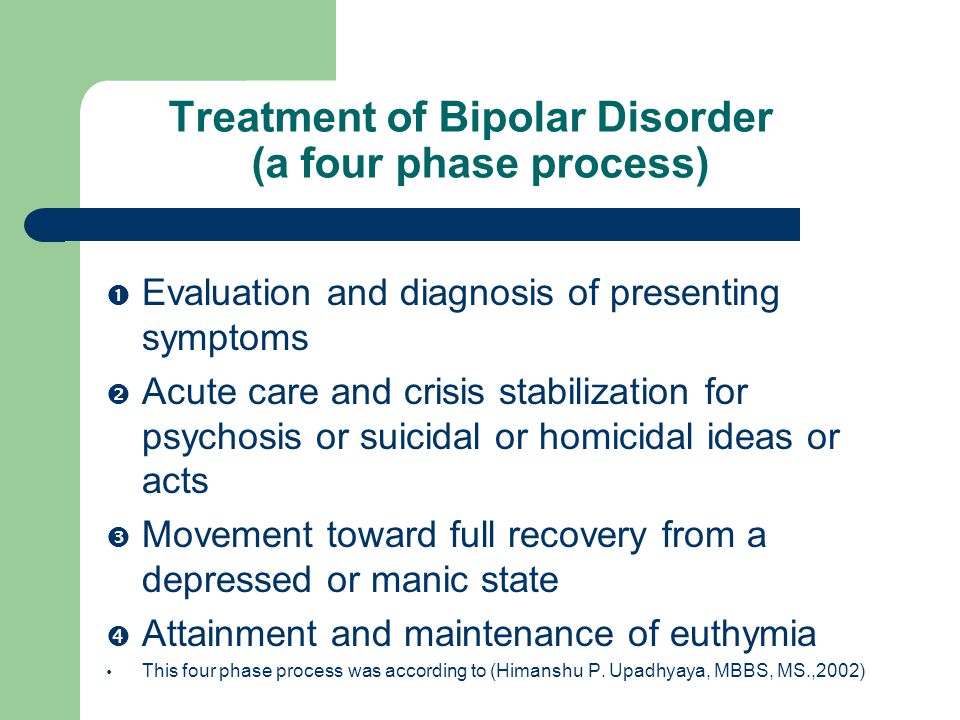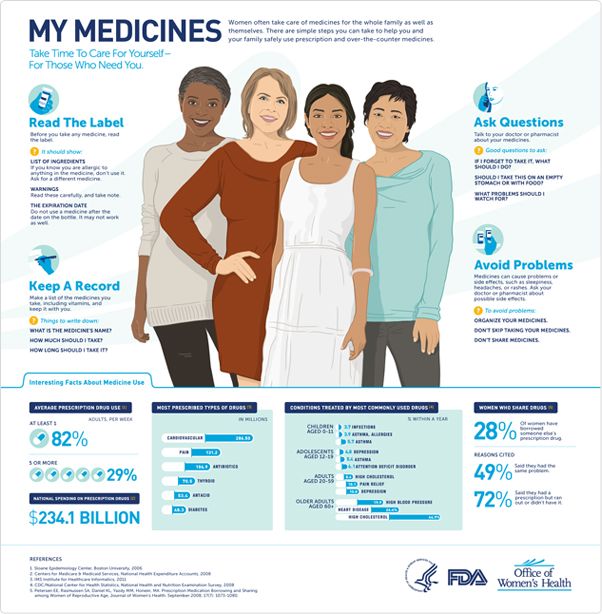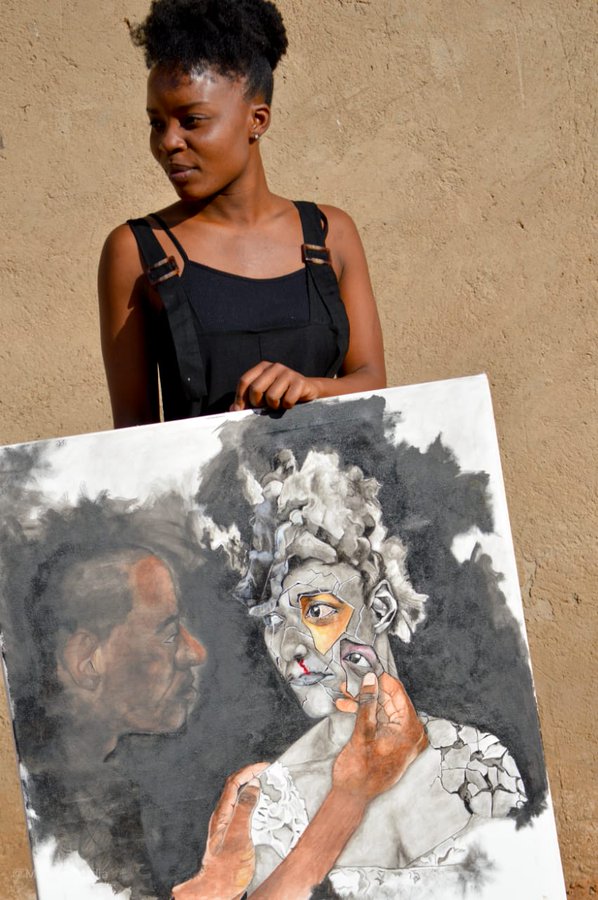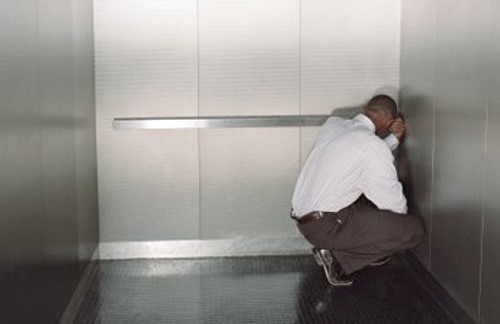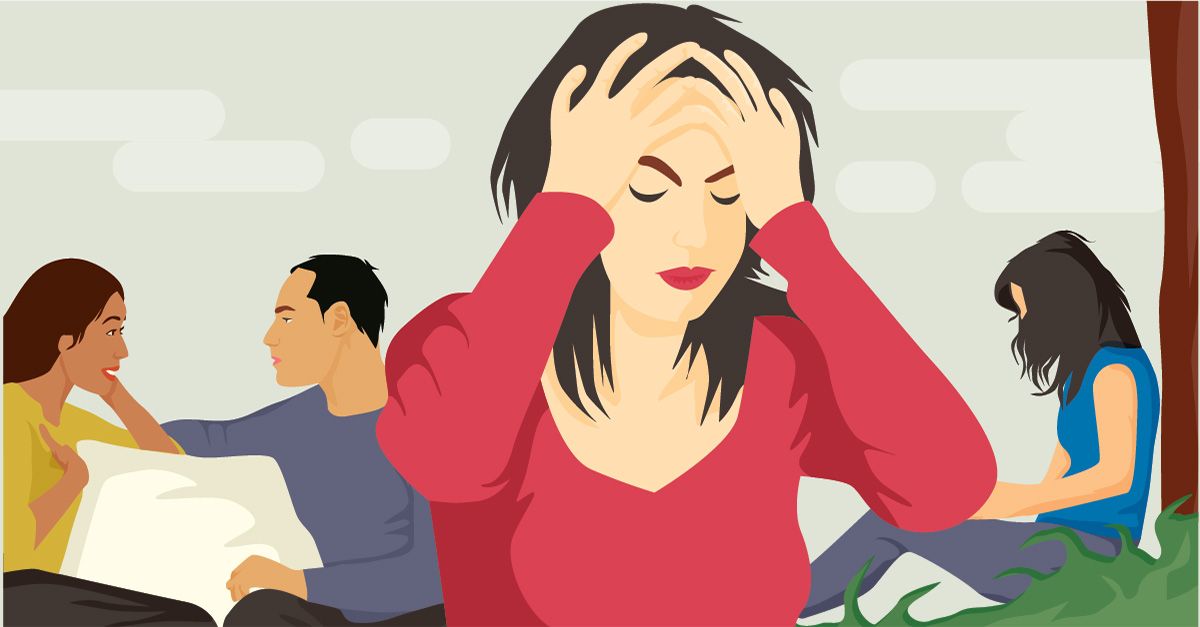Bipolar disorder questions and answers
Expert Answers to Questions About Bipolar Disorder
Written by Carrie Gann
Whether you’ve been diagnosed with bipolar disorder or you care about someone who has it, you know it’s a complicated condition.
WebMD hosted a Facebook Live event to get expert answers to your questions about the disorder. Here are some of the highlights from psychiatrist Smitha Bhandari, MD, and WebMD Senior Medical Director Arefa Cassoobhoy, MD.
I think I have bipolar because I feel so euphoric at times, but then so depressed at others. Are these normal feelings?
Everyone can feel happy or strained with the ups and downs of life. “But when it's bipolar, these things are happening either outside of stressors, or they're happening to a greater magnitude, a much stronger degree than what you would expect,” Bhandari says.
The two phases of bipolar disorder, mania and depression, are more than feeling very happy or sad. When you’re manic, you may have tons of energy, talk very fast, have racing thoughts, don't feel the need to sleep, or take a lot of risks. During the depressive phase, you can feel hopeless or worthless, have no energy or motivation, have trouble sleeping, or even think about harming yourself.
Your doctor or a therapist can help you sort out the differences between normal feelings and signs of a mental health problem. Think about taking a friend or family member to your appointment with you – they can often point out patterns or behaviors you didn’t notice in yourself.
What are the differences between bipolar I and bipolar II?
Both types have the same symptoms of depression, but their manic phases are different. People with bipolar I have “typical” mania -- feeling uncontrollably excited, energetic, and invincible. Some may believe things that aren’t true or feel paranoid.
Bipolar II is a “milder” version of mania, called hypomania. It still makes you feel energetic or restless, have racing thoughts, and take risks, but those feeling are less intense than in mania. It also usually lasts for a shorter period of time.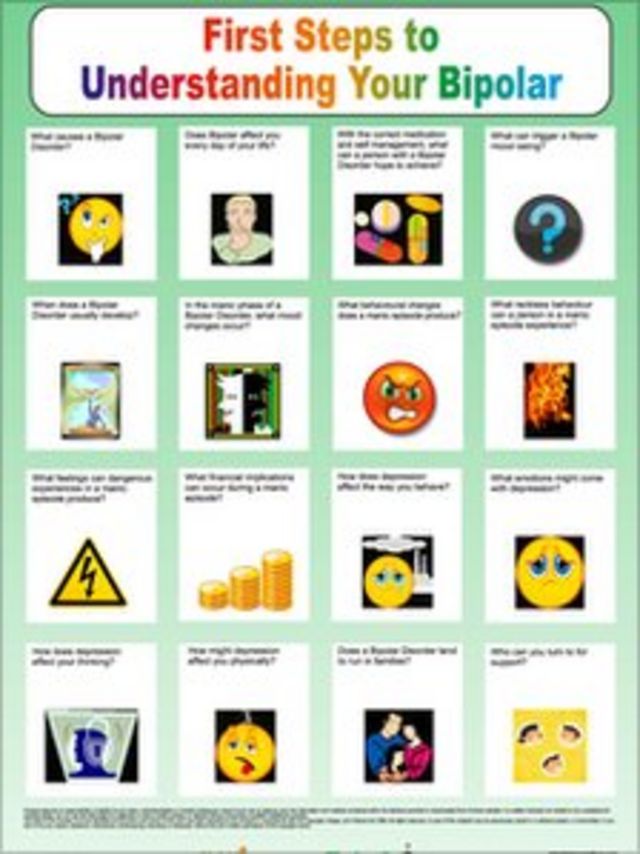
“But that minor version can still be disruptive to your work and personal life,” Cassoobhoy says.
Is it true that bipolar often gets misdiagnosed?
The condition has symptoms that are common in other mental health problems, too. For example, trouble concentrating is a symptom of ADHD, depression, anxiety, and bipolar disorder.
If a doctor or a therapist is only able to look at one symptom or one period of time in your life, it may be harder for them to diagnose the condition. That’s because bipolar mood changes don’t happen day-to-day. Some people have months or even years between episodes of mania or depression.
It will help if you can establish a good relationship with your doctor or therapist, and see them regularly. “There's a real importance to continuity of care, really seeing the big picture over time,” Cassoobhoy says.
Is bipolar always hereditary?
Scientists are still studying how bipolar disorder might be linked to the genes you inherit from your parents.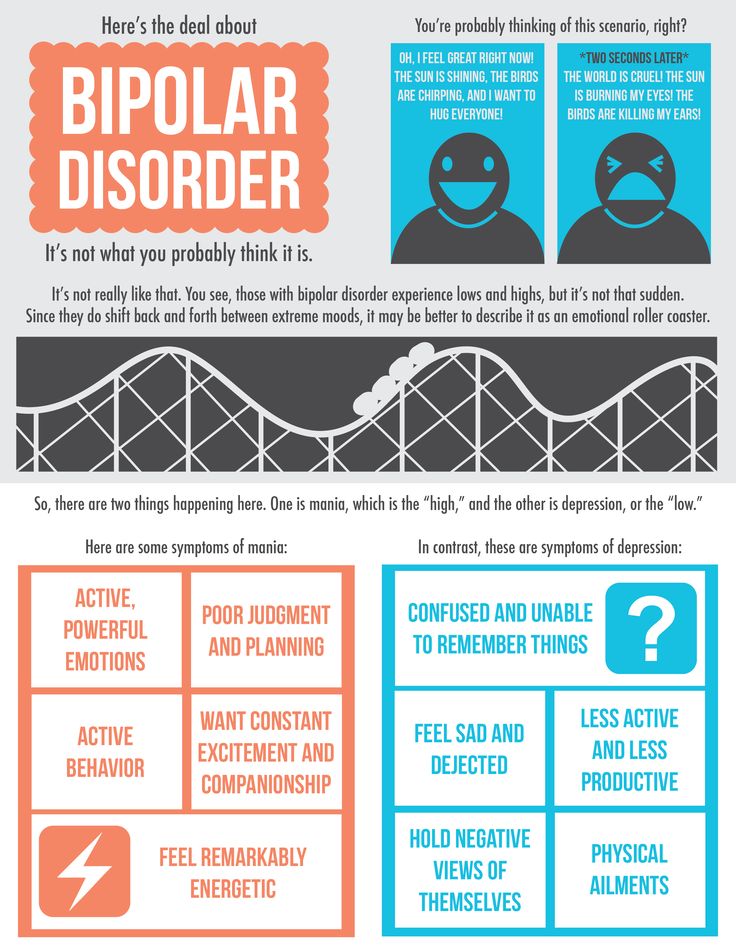 But they are finding that the condition tends to run in families.
But they are finding that the condition tends to run in families.
“Does every person with bipolar identify a family member that has bipolar? No. But there is definitely a growing genetic component,” Bhandari says.
It can be hard to get reliable facts about a family history of mental health, Bhandari notes, because past generations may not have known about bipolar or had access to mental health care. But even if you know you have a relative with the condition, it’s not a guarantee that you will have it, too.
I've been taking bipolar medication for a year. Due to financial issues, I can no longer afford my medicine. What do I do? Is it bad to quit meds cold turkey?
It’s not a good idea to suddenly quit your treatment. “Stopping medicines cold turkey can be uncomfortable, and it can actually be quite dangerous,” Bhandari says.
You could go into withdrawal, or it can make your depression or mania worse.
If money is keeping you from taking your meds, the best thing to do is to talk to your doctor.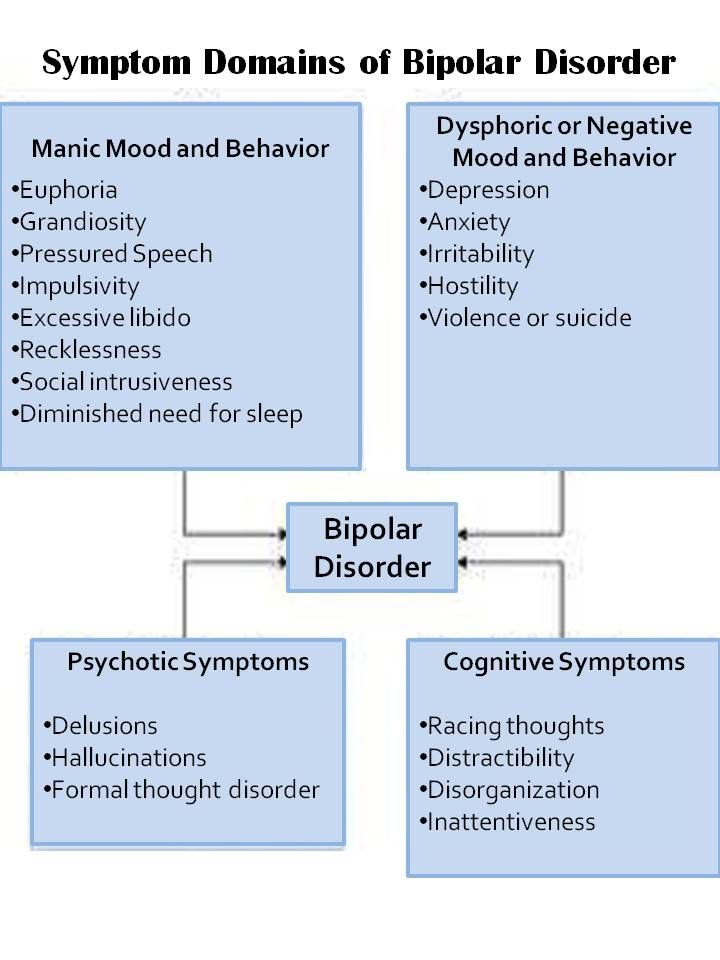 They might be able to switch you to a more affordable generic drug, or call your insurance company to talk about your drug costs. “They might be able to give you some alternatives,” Bhandari says.
They might be able to switch you to a more affordable generic drug, or call your insurance company to talk about your drug costs. “They might be able to give you some alternatives,” Bhandari says.
What is the importance of family members and caretakers for people with bipolar?
It can be hard for those with the disorder to notice their own moods or behaviors, especially during a manic episode when they feel on top of the world. But those symptoms can also make you less able to recognize that something's wrong.
“And that's when it's really important to have family members and caretakers help you monitor, and sort of keep tabs on what your energy's doing, your sleep is doing, maybe what your mood is doing,” Bhandari says.
They also may be able to help you recognize when a bout of mania or depression is about to start. That can give you a chance to get a handle on your mood before the problem begins.
How can I manage the mental exhaustion that comes from the roller coaster ride of ups and downs?
There’s a cycle to bipolar disorder.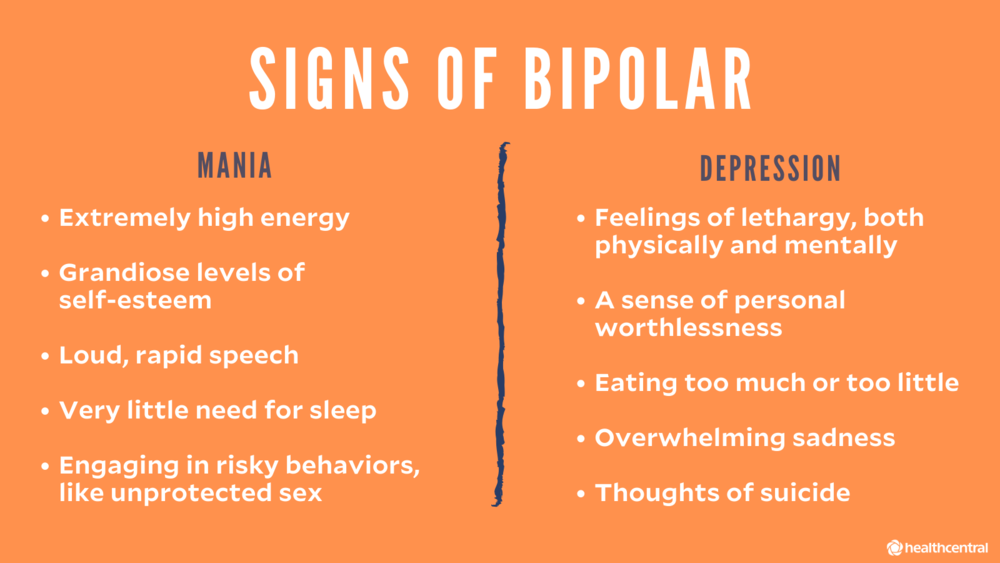 It’s stressful and tiring to deal with your symptoms, but those feelings can also trigger mood swings. So it’s key to try to manage those ups and downs. Bhandari says she tells her patients to try to find a balance between stress and support.
It’s stressful and tiring to deal with your symptoms, but those feelings can also trigger mood swings. So it’s key to try to manage those ups and downs. Bhandari says she tells her patients to try to find a balance between stress and support.
“In the times when you feel like your stressors are really high, so you are exhausted because of the ups and downs of moods, look at what your supports are,” she says.
Support can come in different forms, depending on what your needs are. It could be something as simple as a friend cooking a dinner for you or watching your kids for a couple of hours. It could mean that you ask someone to live with you while you get through a rough time.
Your own healthy habits are also important ways to balance your mood. A healthy diet, getting enough exercise and sleep, and having a healthy routine can make you less likely to get worn down by stress and exhaustion.
My daughter and I both have bipolar disorder. We have enough burned friendships to make us afraid to start new ones.
 How can we keep bipolar from affecting new relationships?
How can we keep bipolar from affecting new relationships?Friends and family are a key part of your support system. So it’s worth it to work on how to protect and grow those relationships.
Therapy can help you improve how you communicate with others, such as how you ask for things or convey your emotions. A therapist can also teach you good ways to manage stress, which can trigger mood swings. There are many different forms, including group therapy, couples counseling, and family therapy.
Bhandari also encourages people with the disorder to be honest with their friends about how it affects them.
“Saying, hey, I have this diagnosis, and sometimes it makes me irritable, or sometimes it affects the way that I feel about you, or the way I feel about myself,” she says. “Sometimes being honest with somebody about that can really help.”
My sister-in-law has violent bipolar mood swings. I want to understand more about why this happens, and how I can help them have a normal life.
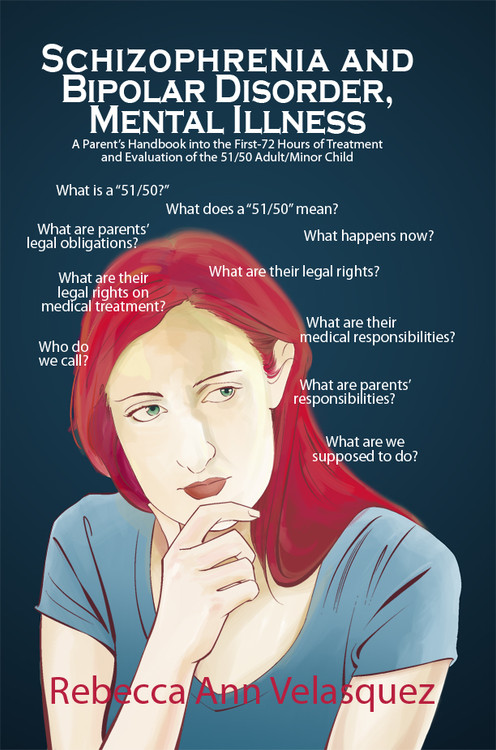 How should I react when they have this explosive behavior?
How should I react when they have this explosive behavior?It’s a challenge to be close to someone with a mental illness when you don’t always understand their behaviors.
“In the midst of it, you're wanting to protect yourself and not take it personally. At the same time, you want to support the other person, get them through their episode,” Cassoobhoy says.
During an outburst, try to stay calm. If they say or do something hurtful or embarrassing, remember that it’s the disorder, not the person, that’s to blame. It’s also a good idea to come to an agreement ahead of time about the things you can do for them when they're in a crisis.
And don’t forget to take care of yourself. Think about joining a support group for family and friends of people with bipolar. If you’re a caregiver for someone with the disorder, protect yourself from getting burned out. Take breaks, and find ways to manage your stress.
I know someone who displays all of the symptoms of bipolar disorder.
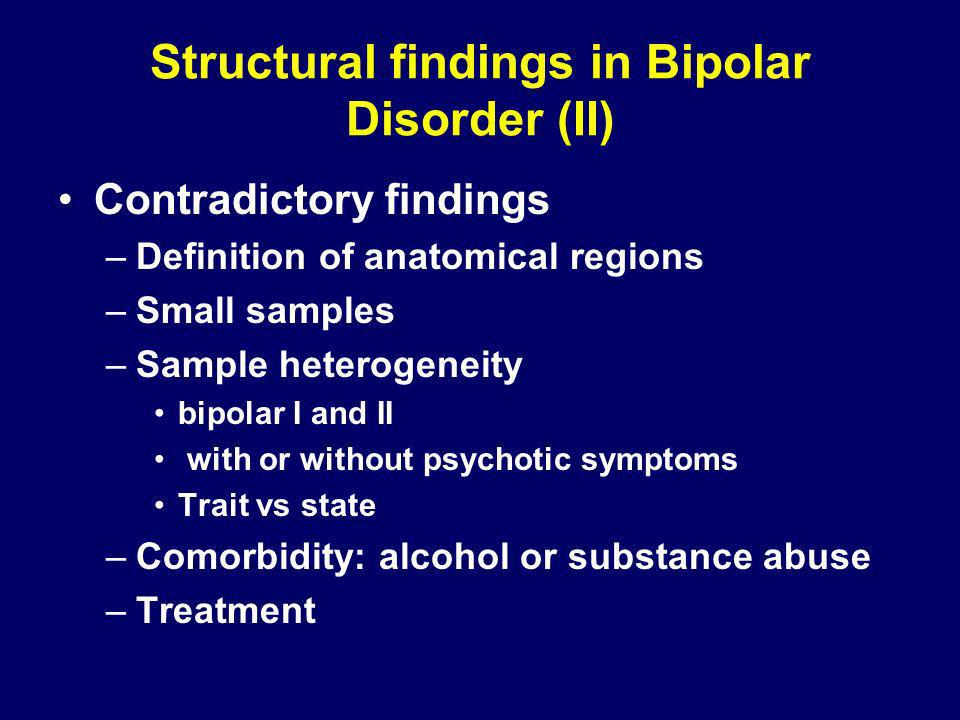 What can I do if they refuse to get help, or don’t think they have issues?
What can I do if they refuse to get help, or don’t think they have issues?A person in the middle of mania feels on top of the world. So they can’t see that there are any problems with their behavior. On the other hand, if they’re depressed, they may feel hopeless or totally unmotivated about getting better.
Bhandari says the best thing to do is talk to the person, but keep the conversation focused on specific behaviors or symptoms instead of delivering your diagnosis.
“You could say, hey, I noticed you're not sleeping well. Let's go to your doctor and talk about sleep. And that's usually not so threatening,” she says.
Everything you want to know but were afraid to ask
What is Bipolar Disorder?Bipolar disorder is a type of mood disorder that affects all areas of life, including your mood, energy level, attention, and behaviors. Symptoms of bipolar disorder are classified into two types of mood episodes, known as depression and mania. Some people with the disorder only experience mania, while others experience symptoms of both mania and depression.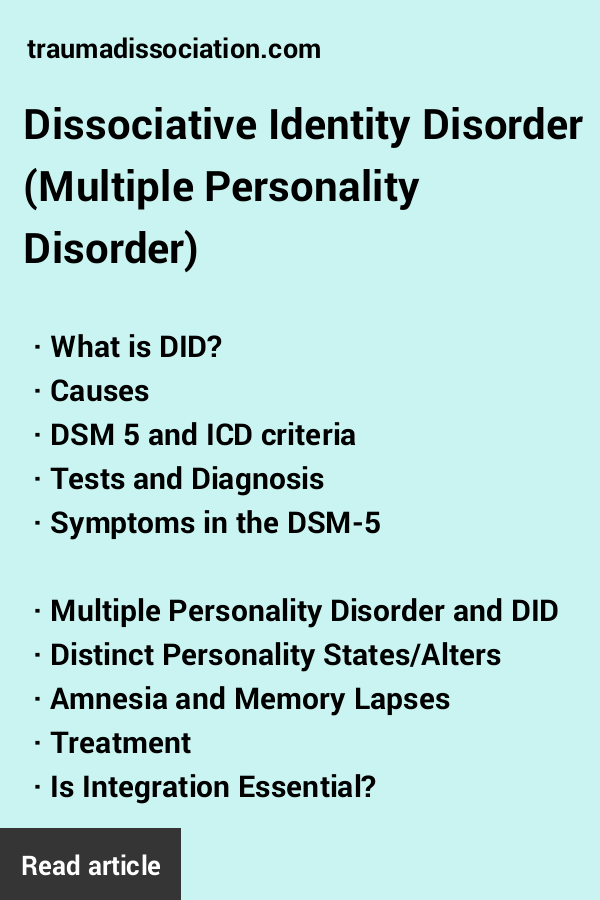 ¹
¹
Roughly 2.6 percent of Americans will experience the disorder.²
What are the symptoms of Bipolar Disorder?Bipolar symptoms are classified into two types of mood episodes, known as mania and depression. When symptoms disrupt daily activities, work, and relationships, they are more likely to indicate the disorder is present.
A manic episode can include:³
increased talkativeness
increased self-esteem or grandiosity
decreased need for sleep
increase in goal-direct activity, energy level, or irritability
racing thoughts
poor attention
increased risk-taking (spending money, risky sexual behaviors, etc.)
A depressive episode can include:⁴
depressed mood
changes in sleep
changes in eating
fatigue or lack of energy
loss of pleasure in activities once enjoyed
restlessness or slowing down
feelings of guilt or worthlessness
indecision or difficulty concentrating
thoughts of suicide
There is no known exact cause for bipolar disorder. Researchers, however, do have a sense of what factors increase your risk of developing the disorder. The disease is highly heritable, so having a family member with the condition increases the risk greatly. Experiencing traumatic events can also increase risk. Though they do not cause the disorder, factors like drug and alcohol use and lack of sleep can also trigger the onset of a manic or depressive episode.⁵
Researchers, however, do have a sense of what factors increase your risk of developing the disorder. The disease is highly heritable, so having a family member with the condition increases the risk greatly. Experiencing traumatic events can also increase risk. Though they do not cause the disorder, factors like drug and alcohol use and lack of sleep can also trigger the onset of a manic or depressive episode.⁵
A doctor, psychiatrist, or other mental health professional must evaluate whether your symptoms have reached the criteria of a manic or depressive episode, or both. They also will need to rule out whether the bipolar symptoms are caused by drug or alcohol use or another medical condition. People who are not receiving treatment for bipolar frequently use drugs or alcohol to cope with symptoms, so you may need medical assistance in detoxing from substances first before an official diagnosis can be made.
What’s the difference between Bipolar I and Bipolar II?If you’ve experienced the full criteria for a manic episode, you may get a diagnosis of Bipolar I Disorder.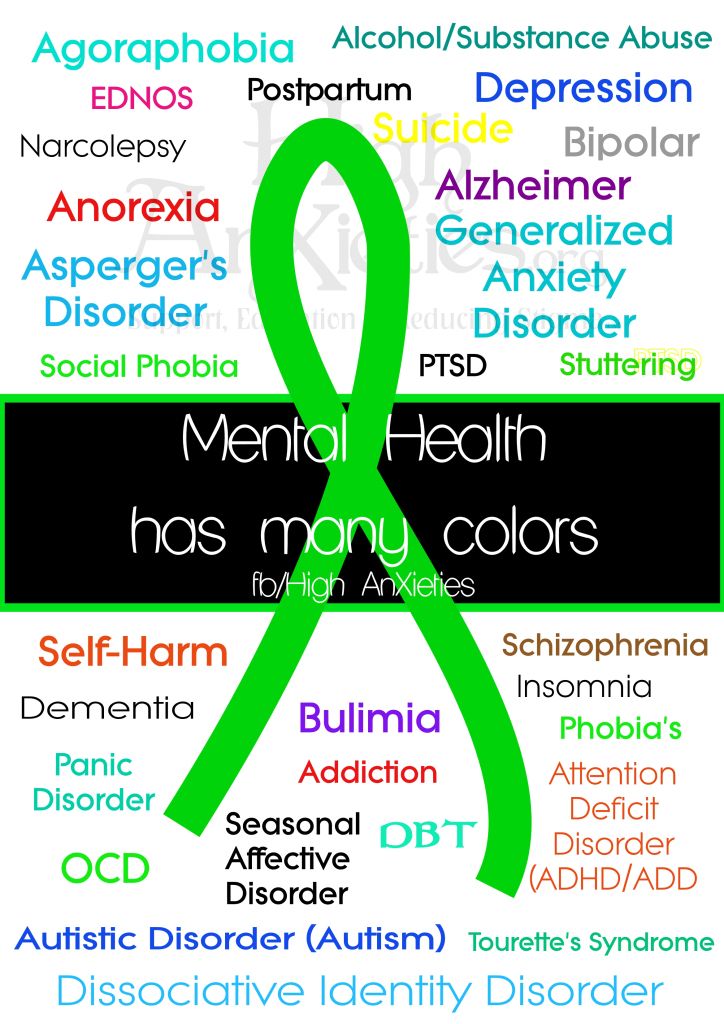 If you have manic symptoms but are not seriously impaired by them and have also experienced depression, you may receive a diagnosis of Bipolar II Disorder. Finally, if you’ve experienced manic and depressive symptoms without meeting the requirements for a full manic or depressive episode, your doctor may diagnose you with Cyclothymic Disorder.⁶
If you have manic symptoms but are not seriously impaired by them and have also experienced depression, you may receive a diagnosis of Bipolar II Disorder. Finally, if you’ve experienced manic and depressive symptoms without meeting the requirements for a full manic or depressive episode, your doctor may diagnose you with Cyclothymic Disorder.⁶
The average age of symptom onset is 25, although children and teenagers also can develop symptoms.⁷
Can children be diagnosed with Bipolar Disorder?Symptoms of bipolar disorder typically emerge in early adulthood, but symptoms can also develop in childhood or the teenage years. Symptoms of the condition may manifest differently in children and teens, with irritability often replacing sad mood for depression or elevated mood for mania.⁸
Can Bipolar Disorder be cured?Bipolar disorder is a chronic condition, meaning it lasts for a lifetime. But the condition is very treatable, and symptoms can be managed with the right combination of medication, therapy, and psycho-education.
But the condition is very treatable, and symptoms can be managed with the right combination of medication, therapy, and psycho-education.
Most people find that treating the symptoms of bipolar disorder requires a combination of medication, psychotherapy, and psycho-education. Sometimes substance use treatment, intensive outpatient programs, and hospitalization are necessary as well.
What are the risks of Bipolar Disorder?People with the disorder are at higher risk for substance use, as people frequently use drugs and alcohol to self-medicate.9 People experiencing a manic episode are also at increased risk for dangerous behaviors that lead to personal injury. People with bipolar disorder are also at higher risk of suicide, so it’s important to encourage loved ones to seek immediate treatment, call at hotline, or go the hospital if they experience thoughts of suicide.
Will I have to take medication for Bipolar Disorder?Medication therapy is a very important component for stabilizing mood symptoms and managing the disorder.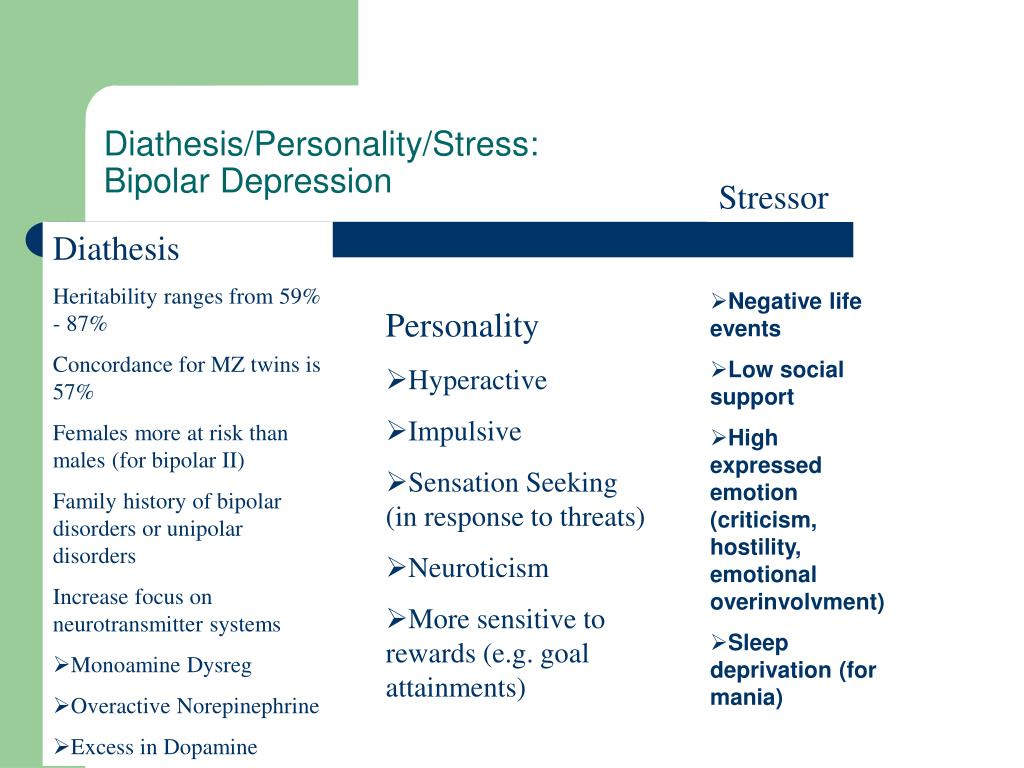 You may be prescribed mood stabilizers, antidepressants, antipsychotics, or anti-anxiety medication. It may take several tries to find the right medication with the fewest side effects, but don’t discontinue use of medication without consulting with your doctor.
You may be prescribed mood stabilizers, antidepressants, antipsychotics, or anti-anxiety medication. It may take several tries to find the right medication with the fewest side effects, but don’t discontinue use of medication without consulting with your doctor.
Encourage your loved one to consult with their doctor about their concerns. Point out your observations about how the disorder may be affecting their daily life. If they are experiencing delusions, hallucinations, or thoughts of suicide, then seek help immediately. You can call the National Suicide Prevention Lifeline at 1-800-273-8255 or encourage them to go the nearest emergency room. Or, simply call or text 988 to reach the crisis lifeline.
- http://www.mayoclinic.org/diseases-conditions/bipolar-disorder/symptoms-causes/dxc-20307970http://www.dbsalliance.org/site/PageServer?pagename=education_statistics_bipolar_disorder
- http://dsm.
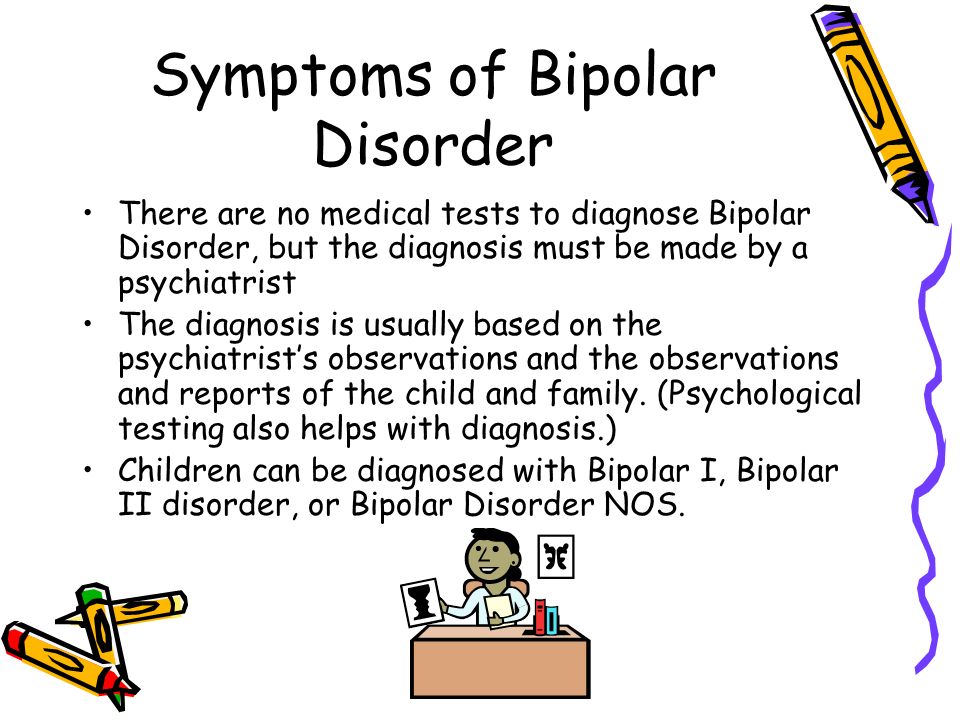 psychiatryonline.org/doi/book/10.1176/appi.books.9780890425596
psychiatryonline.org/doi/book/10.1176/appi.books.9780890425596 - https://www.icsi.org/guideline_sub-pages/depression/diagnose_and_characterize_major_depressionpersistent_depressive_disorder_with_clinical_interview/
- http://www.mayoclinic.org/diseases-conditions/bipolar-disorder/symptoms-causes/dxc-20307970
- http://dsm.psychiatryonline.org/doi/book/10.1176/appi.books.9780890425596
- http://www.nami.org/Learn-More/Mental-Health-Conditions/Bipolar-Disorder
- https://www.aacap.org/AACAP/Families_and_Youth/Facts_for_Families/FFF-Guide/Bipolar-Disorder-In-Children-And-Teens-038.aspx
- http://www.dualdiagnosis.org/bipolar-disorder-and-addiction/
Notes: This article was originally published April 21, 2017 and most recently updated May 14, 2021.
Questions and Answers - Bipolar.su
Questions and Answers Selected Treatment
A guide for people with bipolar disorder and their families” This chapter talks
Read more
Questions and answers Selected Treatment
0005 4 comments
Bipolar disorder is quite difficult to diagnose and treat.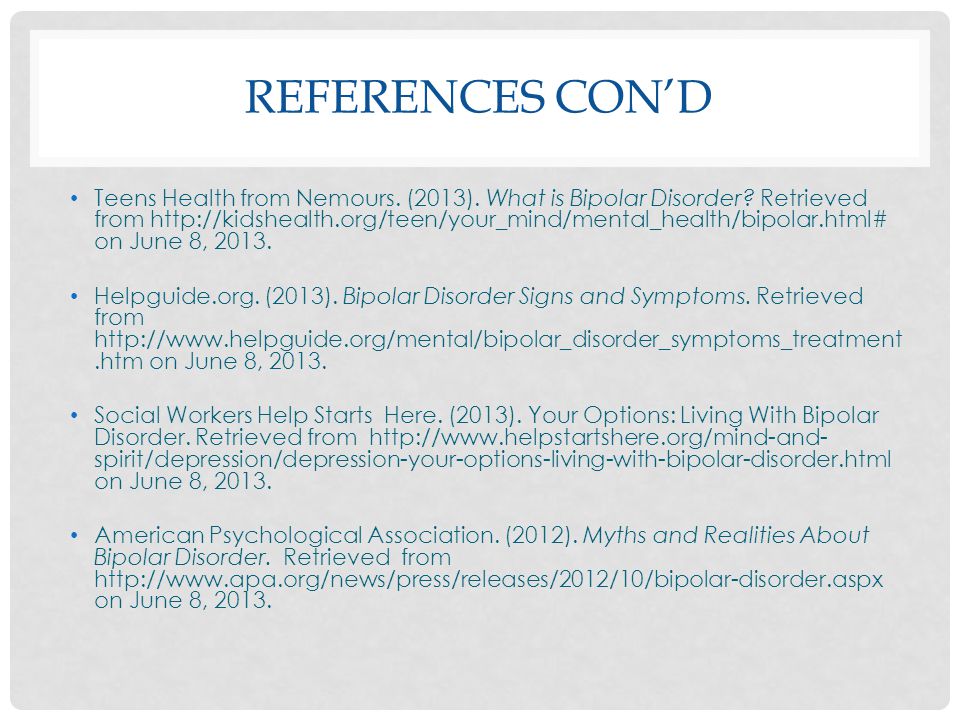 Psychiatrist Anatoly Shepenev answers frequently asked questions about his therapy.
Psychiatrist Anatoly Shepenev answers frequently asked questions about his therapy.
Read more
questions and answers to the chosen
Masha Pushkin, Psycho-Personant
Telegram channel T.ME/IMATRip, dedicated to mental disorders, prepared a detailed analysis anyone who sees a psychiatrist. Many people hesitate
Read more
Questions and answers
Asya Melkonyan, psychologist 0 comments
Mikhail Tenyshkin, psychiatrist, creator of the educational channel Mednauka.net, answers the questions of subscribers .
Read more
Questions and answers
Masha Pushkina, psychoeducator
Analyzing the data of various researchers studying the causes of the development of bipolar affective disorders both in traditional medicine and in alternative, holistic medicine
Read more
Questions and answers
Since I have been writing about bipolar disorder, I have been asked all sorts of questions about it, because there is0003
Read more
Questions and Answers
People X
People with bipolar disorder are often told that "the wrong brain is wrong" with bipolar disorder.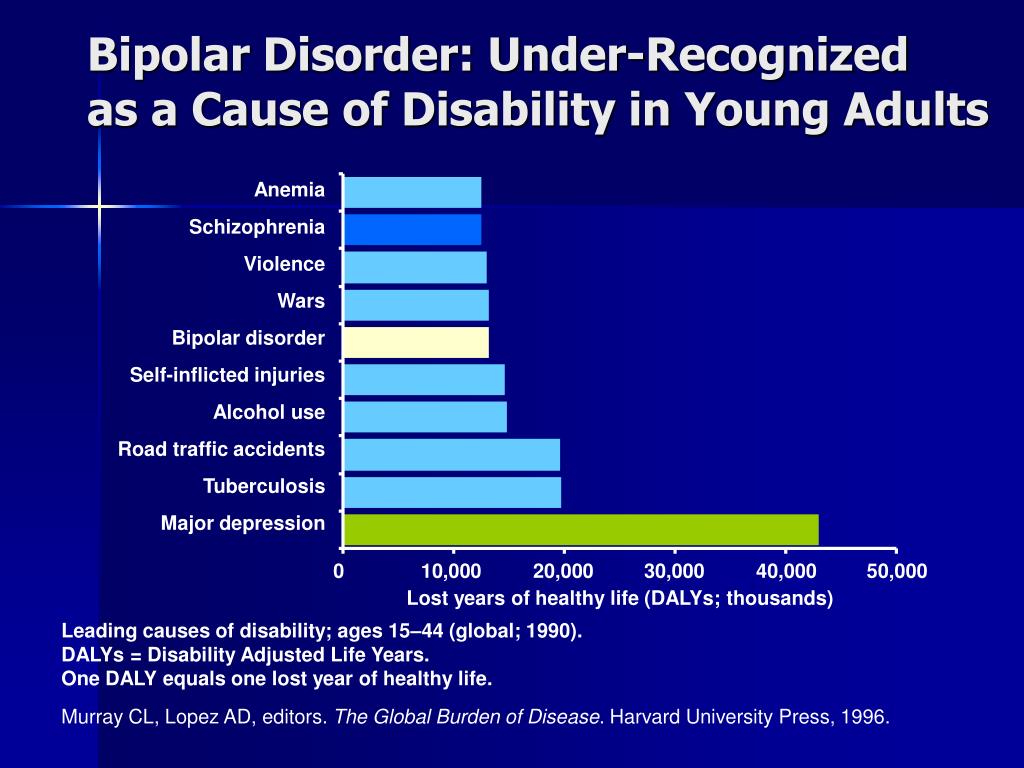 It's time to figure out what it is. Our
It's time to figure out what it is. Our
Read more
Questions and Answers
People X
“Where does it come from with two questions?” and “What triggers episodes of mania and depression?” This
Read more
Questions and answers
People X
We will talk about a brief
Read more
questions and answers
0 comments
We used to call depression any bad mood, not thinking that the depression is actually depressed - disease. What is depression
Read more
Questions and answers
People X 0 Comments
And many have experienced it in one way or another.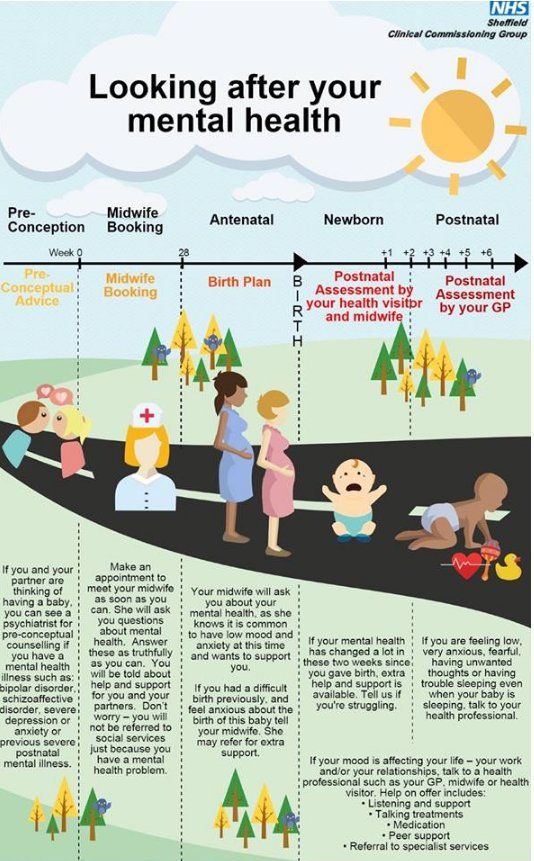 Depression is
Depression is
Read more
Questions and answers
Asya Melkonyan, psychologist 0 Comments
Bipolar disorder has a much more negative effect on a person's life than "normal" depression, and is comparable to schizophrenia in terms of "destructive effect". About 10% of patients commit suicide, most in the first years of the disease.
Read more
Questions and answers
people x 0 comments
O. Lapshin at what age is bipolar disorder more often? Most often, bipolar disorder begins at 15 under 25,
Read more
Questions and answers
People X 0 Comments
There is a point of view that the occurrence of bipolar disorder is due to genetic (hereditary)
Read more
Questions and answers
People X 0 Comments
O. Lapshin How common is bipolar depression? Half the time, patients with chronic depression need to be treated for bipolar disorder. However,
Read more
Q&A
People X 0 Comments
O.900 Bipolar disorder? Bipolar disorder is a mental illness characterized by alternating periods of high mood - manic, and
Read more
Questions and answers
people x 0 Comments
Called mental complaints and changes in behavior that patients refer to. Already at the stage of diagnosis, as
Read more
Test for Bipolar II Disorder (HCL-32) • Psychologist Yaroslav Isaikin
Russian version for detecting hypomanic states.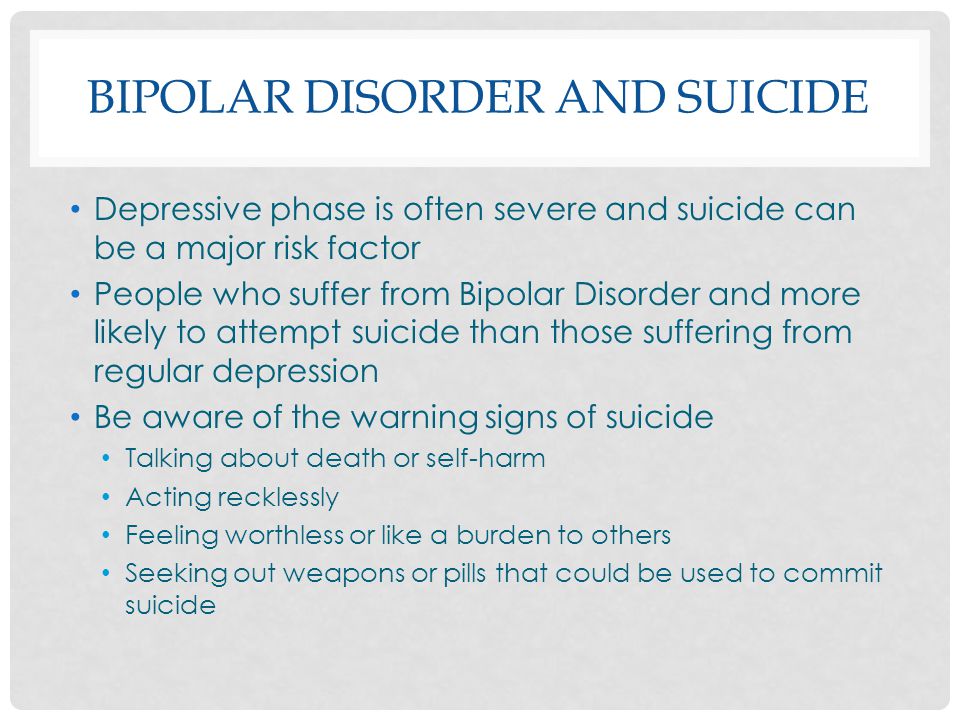 Typically used to detect type II bipolar disorder among patients with a current diagnosis of RDD (recurrent depressive disorder).
Typically used to detect type II bipolar disorder among patients with a current diagnosis of RDD (recurrent depressive disorder).
In case of exceeding 14 points, “a suspicion of bipolar affective disorder type II” is set, and a consultation with a psychiatrist is recommended on this issue.
Bipolar affective disorder (obsolete MDP - manic-depressive psychosis) is an endogenous mental disorder. A feature of BAD is the sequential alternation of “phases”, some of which are manic, and some are depressive. Phases can have different severity, duration, alternation and frequency of occurrence, which determines the specific clinical picture. Since manic episodes are a much more specific manifestation of bipolar disorder than depressive episodes, the diagnosis of bipolar disorder in the framework of the questionnaire is based on diagnosing a manic phase of a certain severity (the main part) and the presence of a sign of alternating "phases" of mood.
Other tests for bipolar disorder:
Bipolar Spectrum Diagnostic Scale for Bipolar Spectrum Disorders
Mood Disorder Questionare for Bipolar I Type
Instructions:
Try to remember a period of "high" condition that was not caused by drugs or alcohol and LASTED MORE THAN A COUPLE OF DAYS (4-6 consecutive days)
How did you feel then?
Please answer questions no matter how you feel now.
1. I needed less sleep
Yes
No
2. I had more energy and was (was) more active
Yes
No
3. I was (was) more confident
Yes
No
4. Work gave me more pleasure
Yes
No
5. I became more sociable (phoned more often, corresponded with people more often, left the house more)
Yes
No
6. I wanted to travel and actually traveled much more
Yes
No
7. I took risks more often, for example, I began to drive a car at a higher speed
Yes
No
8. I spent more (too much) money
Yes
No
9. In everyday life, I often found myself in risky situations (both at work and in other circumstances)
Yes
No
10. I began to move more (go in for sports, walk, etc.)
Yes
No
11. I had many plans, projects
Yes
No
12.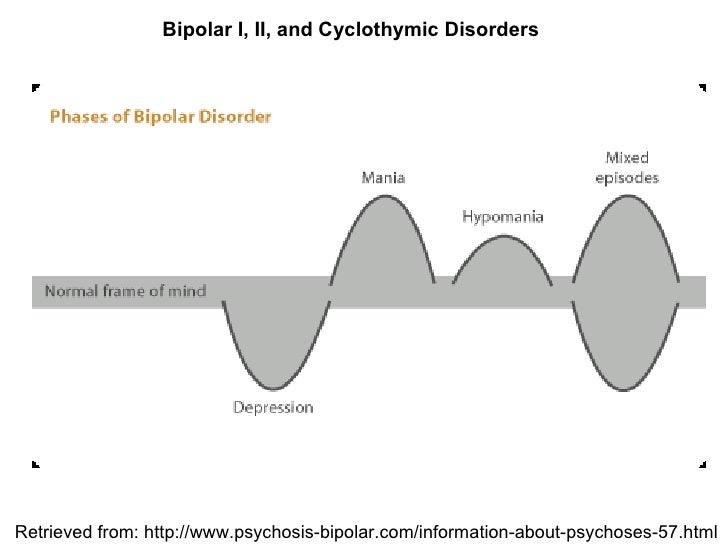 I became more inventive, I had many ideas
I became more inventive, I had many ideas
Yes
No
13. I became less shy and "notorious"
Yes
No
14. I dressed (dressed) more brightly and extravagantly (I used brighter make-up)
Yes
No
15. I wanted to meet people more often, and I really communicated with many
Yes
No
16. I became more interested in sex than usual, sexual desire increased
Yes
No
17. I flirted more often and/or was more sexually active
Yes
No
18. I talked a lot
Yes
No
19. I was thinking faster than usual
Yes
No
20. I joked and punned a lot
Yes
No
21. I am easily distracted
Yes
No
22. I have a lot of new things to do
Yes
No
23. My thoughts jumped from one to another
Yes
No
24. I did everything much faster and easier than usual
Yes
No
25.